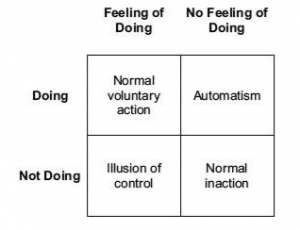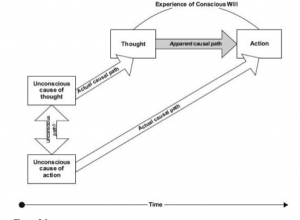The Illusion of Conscious Will by Daniel M Wegner.
This book is a pretty thorough takedown of our subjective feelings of conscious control. Using figure 1.3 as a reference:
Figure 1.3: Conditions of human action.
“ The upper left quadrant shows the expected correspondence of action and the feeling of doing—the case when we do something and feel also that we are doing it. This is the non-controversial case, or perhaps the assumed human condition. The lower right quadrant is also noncontroversial, the instance when we are not doing anything and feel we are not.”
It brings you from this:
to this (if that):
The most damning illustration in the book is:
Which shows consciousness as an epiphenomenon of the worst kind.
Even for me, who’s led off many a meeting with consciousness is a myth, or people aren’t really conscious, this is a bit too much — I want to believe that there is something there, a something that we can legitimately call consciousness, to which we can reasonably assign an function that is both identifiable and useful (not just an epiphenomenon).
I will admit that the function of consciousness could not be strictly necessary for existence in the short term. However, I would like to think that in the long term consciousness has the potential to be a source of greater marginal fitness.
Wegner does offer a couple of potential ways out:
The first formulation is consciousness as a system of accountability:
Conscious will can be understood as part of an accounting system. Its regular appearance in actions of all kinds serves as an aid to remembering what we are doing and what we have done. This, in turn, allows us to de-serve things. One of the key reasons for describing actions and ascribing them to persons is as a way of determining who deserves what
The other formulation compares consciousness to a compass used by a ship’s pilot to assure that the ship maintains a planned course. I think this formulation misses the mark a bit — it would be more accurate to say that consciousness is an entity that can potentially set the course, say North by Northeast after which, autonomic systems kick in to maintain the preset direction. Similar to the way in which we might consciously decide to drive down a particular street without being consciously aware of our actions in keeping the car centered in the lane, or stopping when a cat crosses in front of us, etc.
The combination of these two mechanisms provides a reasonable framework for adaptive behavior, without requiring undue moment-to-moment management of our activities. If we frequently underperform in an activity our bookkeeping system is noting that it is us who is underperforming (modulo various denial mechanisms), and can assign a negative value to our actions: a demerit, if you will. When sufficient demerits have been awarded, the activity can be subjected to conscious review/analysis that can trigger modified training/practice. When the demerits have been worked off by subsequent successful performance(s), our consciousness can recede into the background where it belongs.
There likely isn’t a single level at which cycle of goal setting, monitoring, fine-tuning, and receding-into-the-background takes place. Additionally the structure of the environment in which the decisions are carried out varies in its level of support for the chosen action
Consider a few examples: We have the large-scale decisions: buy a house, start graduate school. These seem to be decisions that people can usually stick to, for a few years at least. Once we make those decisions our environment will buttress our performance: unconscious deterrents to completion are minimized, while the disincentives for abandoning the decision range from peer pressure to harassing real estate agents.
Contrast this with the activities which are rumored to account for many New Year’s resolutions: go to the gym, stop smoking (I don’t do resolutions, so I’m making stuff up here), in which we decide to go in a direction contrary to our daily habits. The spontaneous environmental supports for our new path are minimal, while the habits that we are trying to abandon are encouraged by any number of unconscious prompts and affordances. No wonder that so many of them fail.
Even New Year’s resolutions are resolute compared to our vows to not eat that last cookie despite continual, strong, persistent, beckoning calls from the baked good in question (speaking from experience here).
I think it’s difficult to deny that the direction of environmental and social queues/affordances is a strong, if not critical, determinant of our success in achieving our consciously decided upon goals. Even if we assume that the goals are completely feely willed (which isn’t something that I plan to address).
In the end, if we were compelled to make a forced binary choice conscious or unconscious, no middle ground, it’s clear that the choice must be unconscious, otherwise therapy wouldn’t exist and complying with New Year’s resolutions would be the norm — there are few examples of engaging in moment-to-moment conscious action over the long term (first time at brain surgery, perhaps?), while examples of actions which are clearly not completely conscious action abound: driving, playing the piano, walking.
If we provide a third option, I would suggest it be that there is a role for consciousness, but it’s primarily along the lines of goal and direction setting, rather than actively controlling immediate activity. Wegner’s book, coupled with many of the others mentioned in this blog, make me hesitant to characterize this in much more detail.
This book demonstrates how off our intuitions can be, perhaps in both directions: the section Hypnosis and Will is especially effective in blurring the lines between the two, e.g., subject under the effects of hypnosis perform actions which we would generally characterize as requiring willful intent, but are also capable of performing actions which are expected to yield to neither conscious nor unconscious activity. Wegner’s prime example here is the ability to control warts due to hypnotic suggestion (he supplies a number of references which makes the claim hard to brush off as experimental artifacts).
Placebo effects similarly firmly in space of blurring the boundaries between the conscious and the unconscious.
It’s probably safe to say that, assuming that conscious control exists at all, we aren’t controlling some things that we think we are, while we could potentially control some things that we aren’t.





Leave a Reply